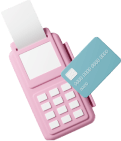Content
- What is fiscalization?
- Has the general fiscalization affected entrepreneurs in rural areas?
- Are there any exceptions for entrepreneurs in rural areas?
- The trade in rural areas without RRO
- Providing services in rural areas without RRO
- Settlement books and accounting books of settlement operations instead of RRO in rural areas
- What type of cash register is best suited to a shop in the rural area?
As of October 1, 2023, Law 3219 (formerly Draft Law 8401) has brought back mass fiscalization for businesses. Does this draft law apply to entrepreneurs who own grocery stores, sell household goods, or provide certain types of services in villages and towns, and are they required to use cash registers? This will be discussed further in the article.
What is fiscalization?
Fiscalization is the process of registering settlement transactions with regulatory authorities in order to ensure transparency of cash flows and compliance with tax legislation. Fiscalization of checks involves the transfer of information about sales to the tax service in real time or after the end of the working day.
During fiscalization, each check receives a unique fiscal number, which confirms its registration. This allows you to control the accuracy of accounting, minimizes the risk of tax evasion and ensures the protection of consumer rights.
Has the general fiscalization affected entrepreneurs in rural areas?
In accordance with Law 3219, general fiscalization encompasses all entrepreneurs executing payment transactions while engaged in business activities. Consequently, entrepreneurs engaged in the sale of goods or provision of services in rural areas (i.e., settlements with the status of villages and towns) are not exempt from this requirement.
A settlement transaction is defined as the acceptance of cash, payment cards, receipts, or tokens from a buyer at the point of sale of goods or services, the issuance of cash for returned goods or unrendered services, or the execution of relevant settlement documents in the event of payment by card.
Read more in our article about the difference between RRO and PRRO and who is required to install a cash register and who is not.

Are there any exceptions for entrepreneurs in rural areas?
The Ukrainian law “On the Use of Cash Registers in the Field of Trade, Catering and Services” specifies which business owners are required to use cash registers. In particular, Articles 9 and 10 of this law provide certain exemptions for entrepreneurs doing business in rural areas, even if they use cash registers.
On the basis of Article 10 of the Law on RRO, the Cabinet of Ministers of Ukraine has adopted Resolution No. 1336, which defines additional conditions and peculiarities of RRO operation in rural areas. In accordance with the aforementioned Resolution, specific types of activities are permitted to operate in rural areas without cash registers, provided that they utilize settlement books and accounting books of settlement operations.
There are distinct exemptions for entrepreneurs selling goods and those providing services. We will examine these in more detail below.

The trade in rural areas without RRO
Paragraph 1 of the CMU Resolution states that retail trade of any goods (household goods, household chemicals, clothing, etc.) in the rural area, which is carried out by individual entrepreneurs (IEs) on a single tax, may be conducted without the use of a cash register.
This is feasible if three conditions are met:
- such retail trade is conducted in premises that do not sell excisable goods, such as alcohol and tobacco;
- the entrepreneur has no online sales;
- village or settlement councils have not required the use of cash registers.
It is permissible to operate a business in a rural area without using RRO/PRRO if the trade turnover per 1 structural unit (a separate store with its own settlement book) does not exceed 167 minimum wages per year.

Providing services in rural areas without RRO
Entrepreneurs providing household services in the rural area have certain privileges and can operate without using RRO/PRRO if this is the case:
- repairing and installing of household appliances and radio-electronic equipment, TV antennas
- fixing and assembling furniture;
- cleaning apartments, caring for children and sick elderly people;
- photographing;
- renovating apartments;
- cooking and laundering;
- repairing of footwear, as well as of sewn or knitted goods, textile and leather goods, and metal goods
There are no restrictions on turnover for these activities. However, individual entrepreneurs must operate without employees and engage in the type of activity outlined in the aforementioned list.

Settlement books and accounting books of settlement operations instead of RRO in rural areas
If an entrepreneur in a village opts not to use RRO/PRRO, they remain obliged to use settlement books and accounting books of settlement operations, and to submit reports on a monthly basis.
The accounting book of settlement operations (abb. KOPO) is a paper-based record of all cash transactions, including deposits, withdrawals, acceptance of payments for goods and services, and returns.
A settlement book consists of numbered receipts that are bound in a secure manner so as to prevent any compromise of security. One half of the receipt indicates the service or goods for which the business received money, and the other half should be retained by the entrepreneur in case of a tax audit.
Clause 7 of Article 3 of the Law on RRO requires entrepreneurs who utilize settlement books to submit reports on turnover based on the books to the tax authorities no later than the 15th day of the month following the reporting month.
This equates to 12 (!) additional reports per year!
What type of cash register is best suited to a shop in the rural area?
Entrepreneurs engaged in business activities in rural areas have the option of selecting either a RRO or a PRRO. According to statistical data, at the beginning of 2024, nearly 70% of all registered financial accounting devices were PRROs.
What are the key benefits of a software-based RRO in comparison to a traditional RRO?
- The software-based RRO can be installed on any convenient device, including computers, tablets, and smartphones, eliminating the need for additional equipment.
- The PRRO is equally effective at stationary and outdoor sales points.
- It eliminates the need for paper reports and accounting books, streamlining administration and data storage through electronic document management.
- Data security: All data is stored in cloud services, minimizing the risk of loss or damage.
- PRRO providers automatically update their software.
- Integration with accounting systems allows for seamless transfer of data from the accounting system directly to the STS website.
As an illustration, the Vchasno.Kasa service enables users to register a software-based cash register online and issue receipts on the same day, as well as connect it to nearly any payment terminal.
These and other advantages of the PRRO can also be useful for entrepreneurs who are not required to install cash registers. Rather than maintaining a settlement book and an accounting book of settlement operations, users can simply install the program.
 The free Basic plan from Vchasno.Kasa offers entrepreneurs significant savings from UAH 2,160 per year, eliminates the need to invest in expensive equipment, and streamlines the issuance of receipts. The plan includes the use of one cash register and 300 receipts per month, free of charge, for individual entrepreneurs or TOVs (LLCs). Receipts can be issued from a browser or mobile application.
The free Basic plan from Vchasno.Kasa offers entrepreneurs significant savings from UAH 2,160 per year, eliminates the need to invest in expensive equipment, and streamlines the issuance of receipts. The plan includes the use of one cash register and 300 receipts per month, free of charge, for individual entrepreneurs or TOVs (LLCs). Receipts can be issued from a browser or mobile application.
Issue checks according to all the requirements with Vchasno.Kasa!
Get a free consultation and learn more about fiscalization and cash discipline.





